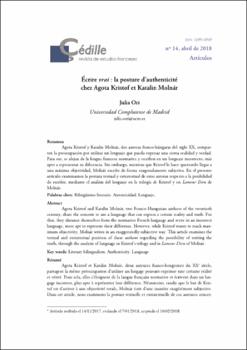Écrire vrai: la posture d’authenticité chez Agota Kristof et Katalin Molnár
Autor
Oeri, JuliaFecha
2018Resumen
Agota Kristof y Katalin Molnár, dos autoras franco-húngaras del siglo XX, comparten la preocupación por utilizar un lenguaje que pueda expresar una cierta realidad y verdad. Para eso, se alejan de la lengua francesa normativa y escriben en un lenguaje incorrecto, más apto a representar su diferencia. Sin embargo, mientras que Kristof lo hace queriendo llegar a una máxima objetividad, Molnár escribe de forma exageradamente subjetiva. En el presente artículo examinamos la postura textual y extratextual de estas autoras respecto a la posibilidad de escribir, mediante el análisis del lenguaje en la trilogía de Kristof y en Lamour Dieu de Molnár. Agota Kristof and Katalin Molnár, two Franco-Hungarian authors of the twentieth century, share the concern to use a language that can express a certain reality and truth. For that, they distance themselves from the normative French language and write in an incorrect language, more apt to represent their difference. However, while Kristof wants to reach maximum objectivity, Molnár writes in an exaggeratedly subjective way. This article examines the textual and extratextual position of these authors regarding the possibility of writing the truth, through the analysis of language in Kristof's trilogy and in Lamour Dieu of Molnár. Agota Kristof et Katalin Molnár, deux auteures franco-hongroises du XXe siècle, partagent la même préoccupation d’utiliser un langage pouvant exprimer une certaine réalité et vérité. Pour cela, elles s’éloignent de la langue française normative et écrivent dans un langage incorrect, plus apte à représenter leur différence. Néanmoins, tandis que le but de Kristof est d’arriver à une objectivité totale, Molnár écrit d’une manière exagérément subjective. Dans cet article, nous examinons la posture textuelle et extratextuelle de ces auteures concernant la possibilité d’écrire la vérité, à travers l’analyse du langage dans la trilogie de Kristof et dans Lamour Dieu de Molnár.





